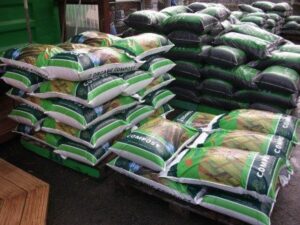As any gardener worth his or her salt will know, mulching is paramount to success in the garden.
Mulching is the best way to keep your soil healthy and moist all year round, whilst also helping to prevent weeds, cool roots, and prevent water evaporation.
A thorough commitment to year-round mulching might sound like a chore, but in truth, it’s a time (and life) saver for serious and casual gardeners alike.
In this guide, we will cover:
h
Table of Contents
What is Mulching?
Why Should I Mulch?
When Should I Mulch?
Which Mulch?
Inorganic Mulches
Organic Mulches
Bark Mulches
Leaf Mulches
Compost Mulches
Grass Clippings
Pea Straw
Mushroom Compost
Horse Manure
How Much Mulch?
How to Spread Mulch
Mulch FAQs
What is Mulching?

Mulch is a protective layer of material that sits on top of your soil to provide insulation from dryness, keeps the soil warm (or cool in the summer), suppresses weeds, and add nutrients that nourish your plants, trees and soil.
By providing a barrier between the soil and the air, mulch also keeps out unwanted insects, birds and animals, while conserving moisture.
Why Should I Mulch?
Aside from giving your plants a nutrient boost, retaining soil moisture and helping control soil temperature, mulching also helps cut down on garden maintenance time for you (less watering and weeding!) With global warming, it will become increasingly important to save water, as we begin to see less rainfall – particularly over the summer months – so getting on top of your mulching schedule will not only help your own garden and plants, it will help the larger environment too.

Mulch also looks great. A beautiful mulch covering over your borders or around trees looks fabulous as a feature, helps your plants stand out, and can even add value to your garden and property.
When Should I Mulch?
Mulch can and usually should be applied all year round (with some exceptions).
- Winter mulching protects plant roots from low temperatures, whilst also mitigating against soil erosion and compaction from heavy rains. If you wait until the weather starts to warm in spring before mulching, plants will grow through the mulch and then have to compete for nutrients with the newly emerging weed seedlings. Preventing your soil from fluctuations in soil temperature is a year round benefit of mulching, especially in a ‘4 seasons in 1 day’ climate such as New Zealand.
- When Spring comes around, you’re going to be grateful to your mulch for preventing too many weeds from creeping through, whilst a great organic mulch encourages earthworms to take up residence in your soils, which contributes to a healthy ecosystem and benefits your plants.
- Summer mulching is all about weed control and ensuring that your soil does not become too warm and dry out.
- Autumnal mulching is again crucial to soil erosion avoidance, and to help perennials stay healthy and survive the winter.
Which mulch? A quick run-down of the different types of mulch.
When it comes to mulching, there’s a lot of choice out there, and picking the right mulch for your project can be overwhelming.
Mulches can be broken down into two main categories: organic mulches and inorganic mulches.
Inorganic Mulches

Using non-natural mulching techniques including plastic sheeting, rubber and landscape fabrics is (in our opinion) a false economy. Over time, these solutions will degrade and in some cases pollute and irreparably damage your garden.
Additionally, inorganic mulching doesn’t add nutrients to or nourish your soils, plants and trees: in fact, most ‘inorganic mulch’ solutions are essentially just weed suppression. From a purist perspective, they probably don’t even count as mulching!
Organic Mulches
Organic mulches, as the name suggests, are comprised of natural, biodegradable material: typically compost, leaves, horse manure, rich bark or grass clippings. Some food waste can also be used to make up a mulch. Let’s look at some specific organic mulch types.
Bark Mulches
Bark is very effective at keeping weeds under control and retains moisture well.
The great thing about bark mulch products is that they are long-lasting, break down slowly, and are great for improving drainage and moisture retention.
At Composting New Zealand, we stock a wide range of aesthetically beautiful bark mulch products including our Bark Mulch, Light Wood Mulch and Arborist Chip. We also stock our ultra-affordable Value Mulch, which is a mixture of aged bark fines and finer pieces of bark mulch (making it great for putting around new plants or trees).
Leaf Mulches
Simply collect your fallen leaves in the autumn, store in bags, and redistribute as mulch when it has turned to mush.

Leaves aren’t packed with nutrients but do make for a good soil conditioner and can be particularly useful if you’re growing fruit bushes, as they create a nice layer between the tree trunk and the fruit. Leaf mulch is also good for vegetable growers who want to encourage root growth.
It’s necessary to think ahead and be well-prepared for the following season if you wish to mulch with leaves.
Compost Mulches
Compost works great as a mulch, improving soils and aiding moisture retention.
If you wish to make your own compost at home, add organic kitchen waste such as vegetables and fruit peelings to well chopped garden waste in your home composting bin and make sure to turn every few months.
It will take around 6 months to produce usable compost for mulching, so for those not minded to compost at home, we recommend our Bio-Gro certified commercially produced organic compost.
As we explore in fine detail in this blog post, we’ve got our commercial composting process down to a fine art here at Composting NZ.
Grass Clippings
Whilst well-composted home garden waste is preferable in most circumstances (and our commercial organic compost an even better option), fresh grass clippings can also be used as a lightweight mulch. Grass clippings are rich in nitrogen and potassium which means they are a great choice for use around veggie gardens.
Vegetable plants can struggle with heavy, wet soil, hence grass clippings make for a nice light-weight mulch.
Pea Straw
Straw is an exceptional mulch to use with vegetable and fruit plants, as it is clean, light and breaks down easily. Some straw mulches may be mixed with hay, so it’s important to source weed-free straw such as our competitively priced pea or barley straw.
Straw mulch around strawberry plants not only looks fantastic but also aids moisture retention and thwarts weeds.
Mushroom Compost

Mushroom compost is an alkaline mulch with a high pH, making it ideal for use around vegetables such as kale, cabbage, and broccoli.
Essentially a leftover compost from mushroom farming, mushroom compost can lighten heavy soils, but it’s important to be selective when using mushroom compost as many acid-loving plants including berry plants and many flowers need soil with a lower pH range than that which mushroom compost will cultivate. Also beware using non-organic mushroom compost, as you may inadvertently introduce unwanted chemicals to your soil.
Horse Manure

Horse manure is really more of a fertiliser for your plants, and should only be used once the manure has aged and dried, otherwise it may burn the roots of your plants. Additionally, some horse manure will inevitably contain weed seeds that have been digested by the horse.
To use as an added fertiliser agent, work methodically into your soil around the base of each plant, about 1/2 to 2 inches deep. Be careful not to overdo it.
To help you choose the right mulch when shopping with Composting New Zealand, we’ve developed a brief quiz to help you choose the right product.






